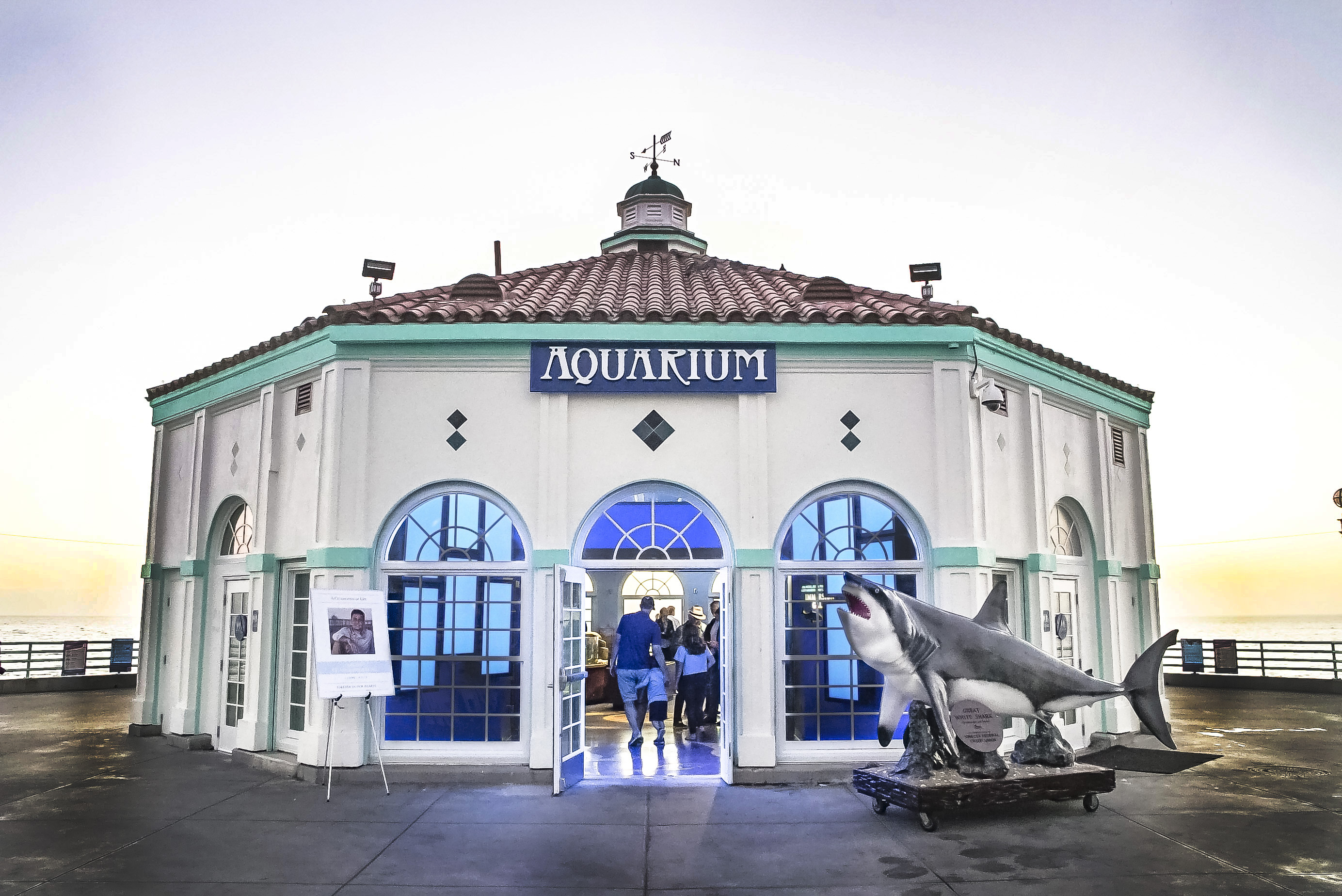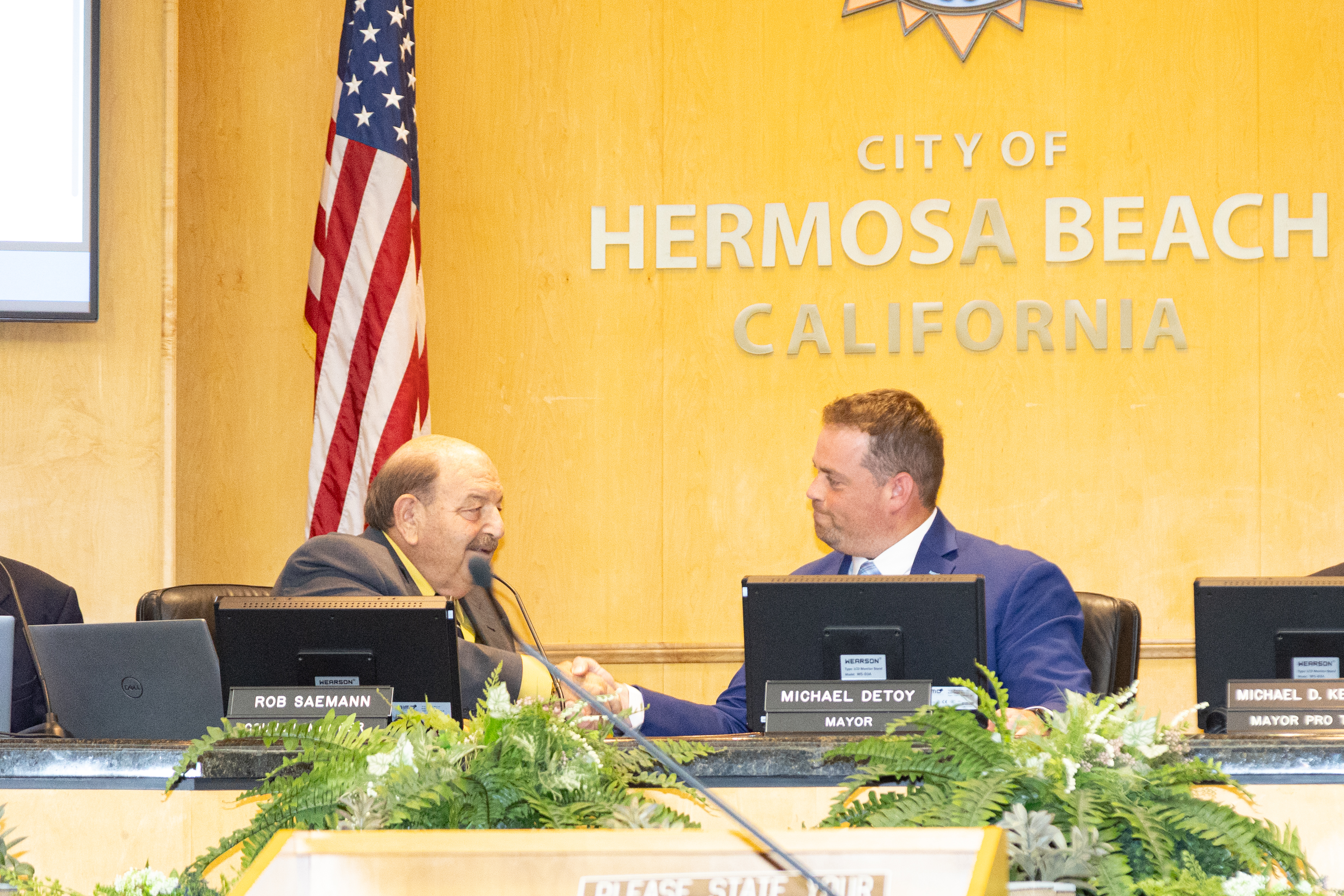
by Alene Tchekmedyian
Idris Al-Oboudi remembers the day he left Baghdad, on Friday, September 15, 1978.
It was a risky move that could have cost him his life.
Calm down. Stop sweating, he thought.
He was drenched under the maroon suit and tie he wore, exhausted because he hadn’t slept the night before. He had $600 and a visitor’s visa in his pocket, but he had no intention of coming back.
“This was my big show,” said the former ballet dancer, now the Manhattan Beach recreation services manager. “One of the biggest performances of your life.”
The exit strategy had been in the works for years. Three of his brothers had already left Iraq, soon after the Ba’ath Party took power.
Al-Oboudi was reluctant to go – he was leaving behind his family, friends, his dance partner whom he was madly in love with, a country full of history and culture, and a scholarship to study music and ballet in the Soviet Union.
On top of that, he had to keep his escape plans totally secret. It was a matter of life and death.
But his father insisted it would be more dangerous to stay.
The country’s economy was booming. Iraq nationalized its oil in 1972, and money was flowing. But Al-Oboudi’s father’s vision was bleak.
“My father saw something else,” Al-Oboudi said. “It’s as if they were fattening the sheep before the slaughter.”
He was right.
Within two years, Saddam Hussein would take power, lead a brutal purge responsible for the execution of hundreds, and invade Iran, beginning an eight-year war that would claim 500,000 lives.
Al-Oboudi had just turned 18 and was eligible to be drafted into the Iraqi military. “I would’ve gone into the army,” Al-Oboudi said. “I would’ve been either dead or wounded or destroyed.”
Al-Oboudi’s father had left a handsome sum with the government – a deposit of sorts – that would ensure his son’s return to the country.
But both Al-Oboudi and his father knew that was highly unlikely, even though running away, he recalled, was borderline treason and would cause his remaining family members to be ostracized in their own community.
“That’s a risk my father was willing to take,” Al-Oboudi said.
That clear-skied morning, his father, uncle and close friend said goodbye on the curb outside the airport – non-travelers weren’t allowed inside – before a woman, an airport employee and distant family friend, ushered him into a line of French diplomats, guaranteeing he wouldn’t get searched. With his hair combed back, he blended in.
“That was very risky,” he said.
He kept his cool, though nervous, and glided comfortably through the line.
If something went wrong and he was discovered, his uncle would launch the backup plan, and try to whisk him away to safety.
Al-Oboudi passed through security that morning and eventually boarded the plane to Beirut, Lebanon, launching his journey to the United States.
“When plane took off, I couldn’t…I just start crying. I cried and cried and cried,” he said. “I knew this was it.”
And he never returned.
Flashing forward
One recent weekday, Idris Al-Oboudi had just gotten off the phone with 15-year-old Swiss actor Giuseppe Bausilio, who played “Billy” in Billy Elliot the Musical on Broadway.
Bausilio had landed a role in a film playing an Iraqi boy and Al-Oboudi was coaching him on his accent – making sure he rolled his R’s in an authentic, not cartoonish, way.
“He said, ‘How are Iraqi boys?’ I said, ‘They’re just boys, they care about ice cream and chasing girls,’” Al-Oboudi said.
The 52-year-old Manhattan Beach recreation services manager is used to working with youth and has a deep foundation in the arts. His father, Jassim Al-Oboudi, was a prominent actor, director and diplomat in Iraq, and his mother, Margaret Ann Morris, an American, worked at the Art Institute in Baghdad for 30 years. His parents met when Jassim was completing his master’s degree in Chicago in 1948. They were married in 1950 and moved to Iraq to raise their family.

Al-Oboudi’s been nationally recognized for his accomplishments – he helped turn the Pumpkin Races into a nationally renowned event, created the Manhattan Beach Teen Center, plans youth trips to Big Bear, and has created manuals for managing and organizing events that have been picked up by recreation departments globally.
“He has the will and the charisma to move things forward, to sell people on an idea,” said his brother, Daniel Jassim. “And it turns out to be a success.”
The entertainer
Al-Oboudi has always had a knack for entertaining. When he was five years old, his neighbor in Iraq, a television reporter, plucked him to appear on children’s television programs. He could speak English, which was a novelty in their neighborhood.
At home, he’d make his mom laugh with stories and jokes. He thought that if he were entertaining enough, he wouldn’t have to go to school. “I wanted to play, not go to school,” he said.
He later attended the Baghdad Music and Ballet School, a joint venture between the Soviet Union and Iraq, where his dance teachers called him Gagarin – after Yuri Alekseyevich Gagarin, the first human to travel to space – because his jumps were so high.
He was once kicked out of the school for a short time. When an administrator refused to let him and his peers put on a production they’d been rehearsing for, Al-Oboudi took a pair of shoes and put them on the table. Two photographs hung on the wall of the country’s president and vice president. “These two,” Al-Oboudi said, pointing to his shoes, “are worth you and those two,” he continued, pointing to the pictures on the wall.
“I have a deep resentment of bullies,” Al-Oboudi said recently.
His office in City Hall is now inundated with plaques and certificates – recently, the National Parks and Recreation Association recognized him for being an innovator in the field.

“Idris is always looking for ways to improve – looking for new ideas, thinking outside the box,” said Jim Stecklein, the former director of Manhattan Beach Parks and Recreation, who hired Al-Oboudi to work for the city in 1986. Stecklein retired in 1992.
Al-Oboudi gazed at the awards sprinkled around his office one recent weekday, and recalled the embargo on Iraq throughout the ‘90s that caused the deaths of hundreds of thousands of children. “To give anything back,” he said quietly, fighting back tears.
“I love Iraq, but it’s painful,” he said, recalling the country’s strife. “It shapes you, but it has not determined me.”
A rocky move
Life wasn’t easy for Al-Oboudi after he settled in Three Rivers, Michigan. The Iranian revolution in 1979 had crippling effects on race relations in the United States, and because of his “as President Obama would say, funny” name, Al-Oboudi was subjected to racism and ridicule.
This confused him. He’d read about Muhammad Ali, Khalil Gibran and Casey Kasem – prominent ethnic Americans. Surely his name, Idris Al-Oboudi, was American. “I thought I was American,” he said. “My name, to me, was an American name.”
Al-Oboudi’s memory is stellar. He can recall, with great speed, specific dates of important life events, his old phone numbers and addresses in Baghdad, and even the expression on his uncle’s face when they played poker in Baghdad using rice as chips. But he can’t recall phone numbers or addresses of his first few years in the United States.
“It’s a mental block or something. I was trying to not get hurt,” he said, likening himself to a rolling stone, viewing his situation at the time as temporary.
He’d left behind what seemed like his entire world. Perhaps most painfully, Al-Oboudi forced himself to walk away from the love of his life without so much as a farewell.

The Wednesday before he left, he dropped by an Iraqi country club to say goodbye to his dance partner and best friend, Thanaa Derwish Al-Samir, whom he’d loved since they were elementary school children. She was a member of the Iraqi upper class, and the country club itself was a vestige of the country’s British colonial history.
“My father refused to be a member of those places,” Al-Oboudi recalled. “I went….I came in dressed neat, long hair. I could see her past the reception area. I walked in and saw her, laughing, talking, very alive and well. And I just turned around and walked away. I said, ‘I am not going to destroy that. Let her be happy.’
It was an image he would carry in his mind for decades: joyous Al-Samir, tanned, lithe and athletic, a swimmer and a dancer in the full flower of her young beauty.
“She never knew I was leaving,” he said. “That was the last time I saw her….That’s the memory I’d like to have of her. It was hard. It made her very angry at me when I left.”
Al-Samir kept in touch through letters. When she realized how homesick Al-Oboudi was – he was always sending postcards home – she’d walk around school and birthday parties with a tape recorder, having friends record messages to him that she would later ship over.
But the letters would often take six months to arrive, and when they did, they’d already been opened by Iraqi inspectors.
The two grew apart and built separate lives, keeping in touch only through annual New Year greeting cards.
But late in 2007, Al-Oboudi heard Al-Samir, who was living in Virginia, had recently been separated. After a few phone conversations, Al-Oboudi visited Al-Samir in Virginia.
She told her brother, who was getting married in just a few months, about her reunion, and he insisted Al-Oboudi come to his wedding in London. Al-Oboudi instantly clicked not only with his old friend, but also with her extended family as well.
“It felt right,” Al-Samir said, adding that he seemed to be her missing puzzle piece. “It fit well.”
The day after the wedding, Al-Oboudi asked Al-Samir’s father his permission to ask for her hand in marriage.
“When he met with my family, it was like they knew all along,” she said.
Soon after, at a family cookout in London before Al-Samir’s brother took off on his honeymoon, he proposed. They married in California in 2008 and have four grown kids.
“After three wars, we got back together,” Al-Oboudi said. “Immigration and war separated us for a very long time.”
But it’s as if they never missed a beat.
Recently, the two were watching TV when Al-Oboudi went to the kitchen and returned with a snack. “He took a bite, and I just looked at him, and he came and said, ‘Here have a bite,’” Al-Samir recalled. “Did you hear me?” she had joked.
“He said, ‘Yes, with my heart.’”
Discovering recreation
When Al-Oboudi moved to the U.S., it was a struggle finding work. After a stint at McDonald’s, he got a job as a security guard at a hospital in Michigan. At work, he’d gravitate toward children, performing magic tricks, impersonating cartoon characters and making them laugh. Within a month, he was officially assigned to the children’s ward.
To put himself through school at Western Michigan University in Kalamazoo, he worked odd jobs as a silk screener, nurse’s aid, chef, janitor and private ballet tutor.
One semester, Al-Oboudi took a recreation class. “It’s like a new world opened up for me,” he recalled. “I can be the guy who puts on these programs…I can be the umbrella of this stuff happening at municipal level.”
Recreation, he said, doesn’t care about the color of your skin. “In recreation you can steal and be rewarded – you can steal second base. You can lie – I’m the king of France, in a play,” he said.
He remembered when as a kid in Iraq on Christmas Eve, he’d be sleeping and his family would stay up all night sprinkling baking powder around the house to look like snow, stepping in the powder with boots to make it look like Santa visited, and setting up and decorating the Christmas tree with ornaments and lights.
He brings this creativity and passion to his events. Like when he plays a white-coated “doctor” at the city’s annual pumpkin race, or judges the city’s sandcastle design contest.
“When a kid shows up and says, ‘You did this all for me?’ I would like to say to them, ‘Yes,’” he said.
In the 1984, he visited California. When he noticed people of different races and with different accents, he knew it’s where he wanted to be. “I wouldn’t stick out,” he said. “My name would not stick out, my look wouldn’t stick out. And, recreation was 24/7 in California.”
He moved to Redondo Beach in 1985. Within two years of working for the city of Redondo Beach, Al-Oboudi, then 25, was promoted to recreation supervisor.
A few years later, Stecklein hired him as the youngest full-time recreation supervisor for the city of Manhattan Beach.
Noting Al-Oboudi’s ability to work with kids, Stecklein assigned him to oversee children’s playground programs. One day, Al-Oboudi was playing basketball with sixth graders. With his background in ballet, “he was demonstrating to the kids how he could jump,” Stecklein said, noting that he was able to reach beyond the rim of the basket. “The kids were enthralled watching him…that kind of demonstration helps him build rapport with young people, and respect – that’s important when dealing with youngsters.”
Soon after he started working in Manhattan Beach, he met Charlie Saikley, the beloved “Godfather” of beach volleyball, whose parents had immigrated to the United States from Syria. When Saikley noticed Al-Oboudi’s name, Saikley approached him and in Arabic said, “May peace be upon you,” Al-Oboudi recalled. “We hit it off – since 1986, until the day he passed in June of 2005.”
Colleagues said Al-Oboudi went beyond planning events – he created blueprints on how to plan and execute every program he developed.
“Anything I took over that was given to me or I asked for or developed, I always wrote a manual for,” he said, pointing to ski trips, pirate day, make a circus, family campouts, ice block bowling and the fishing derby.
“He kind of mesmerized me with his vision,” said Mike Mudallal, father of three kids who grew up attending Al-Oboudi’s summer camps.
This earned him his first national recognition by the National Recreation and Parks Association. He’s since spoken at TEDx conferences and before recreation organizations around the nation. When Al-Samir attends the conferences to take photos of her husband, she often gets distracted. “I get so wrapped up in what he’s saying that I forget to take pictures,” she said, with a laugh.
Despite all the struggles he’s faced, friends and family say he’s full of empathy, love and compassion. “He’s just a big kid,” said his brother, Jassim, who works as a recreation supervisor for Culver City. “He never fully grew up in the sense that you get jaded and bitter by the world. He just always kept a playful, big-kid attitude.”
“All of the, ‘camel jockey,’ ‘go back home,’…Idris didn’t let that get to him,” Jassim said.
Al-Oboudi lost a lot of family and friends over the years to the violence that engulfed his native land. But his entire immediate family eventually made it to the safety of the United States.
Every Thursday, Al-Oboudi trades his tie for a recreation staff uniform, swaps his ID badge for a whistle, and jumps into the day’s activities, like his volunteers and recreation leaders, Jassim said, whether it be on the city’s 20 parks and playgrounds, eight sports fields, 10 tennis courts, six basketball courts or its ceramic studio.
Torrance resident Mudallal has been sending his kids to summer camps in Manhattan Beach since 1999. “I feel my kids are very safe there,” Mudallal said. “Now both my kids are leaders.”
And Al-Oboudi’s leaders have gone on to become police officers, firemen, teachers and university professors. He’s even walked some of them down the aisle.
That, he said, is what he wants to be remembered for. “Not the tragic part of my life, but the victorious part.”







